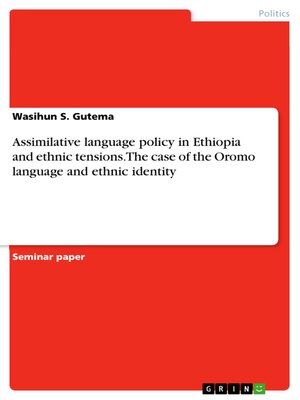Assimilative language policy in Ethiopia and ethnic tensions. the case of the Oromo language and ethnic identity
ebook
By Wasihun S. Gutema

Sign up to save your library
With an OverDrive account, you can save your favorite libraries for at-a-glance information about availability. Find out more about OverDrive accounts.
Find this title in Libby, the library reading app by OverDrive.



Search for a digital library with this title
Title found at these libraries:
| Library Name | Distance |
|---|---|
| Loading... |
Seminar paper from the year 2016 in the subject Politics - Topic: Peace and Conflict, Security, grade: A-, University of Baltimore, language: English, abstract: The study detailed in this paper digs into the assimilative language policy of Ethiopia and how this language policy is fueling ethnic tensions. The paper elaborates specifically on the Oromo language, hereafter Afaan Oromo, and how the speakers of the language are marginalized so as to be included into the Ethiopian identity, an identity believed to be of civilization, through assimilative language policy. This assimilation countered pluralism or diversity in a brutal way in order to homogenize the diverse Ethiopian population - particularly the largest Ethnic group, the Oromo - into the Ethiopian identity or Ethiopianism. As the Ethiopian identity, an identity emanating from and of the ruling class, the Amhara population and the Amharic language, it was a solid state-building instrument with the power of creating belonging and loyalty to the state. Although this policy of assimilation was seemingly countered by the communist regime soon after the communists came to power in 1974, in essence the communist policy did not deter from the predecessor's language policy of centralization. The centralization process through the Ethiopian identity-making via language suppression and depriving one of one's identity seemed to come to an end, once again, in 1991 with the fall of the communist regime and the end of singularity, which is the idea of one nation with one language. Although pluralism is growing, still ethnic tensions are high and accompanied by vast grievances about the past and about how the current regime handles ethnic tensions, language issues especially. The example of Afaan Oromo, a predominately spoken language in Ethiopia, is pertinent, as speakers of the language are deprived of job placement in the federal government and systemic means of marginalizing the language are used.







